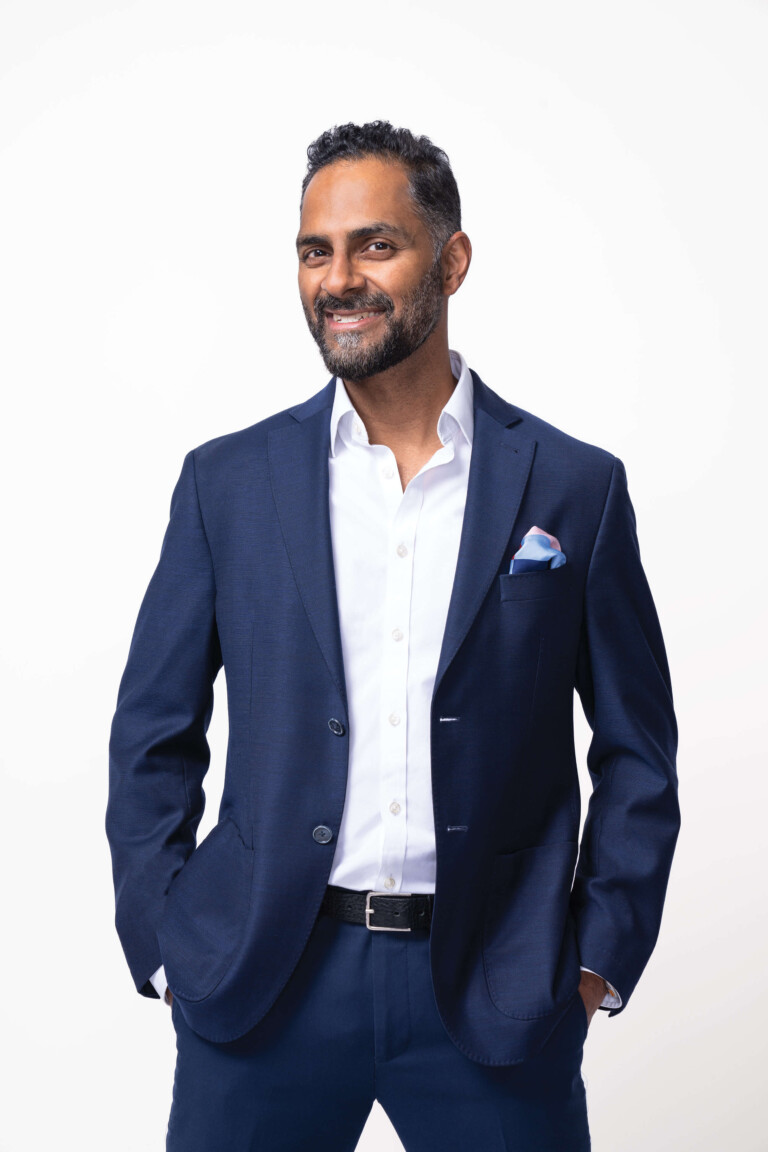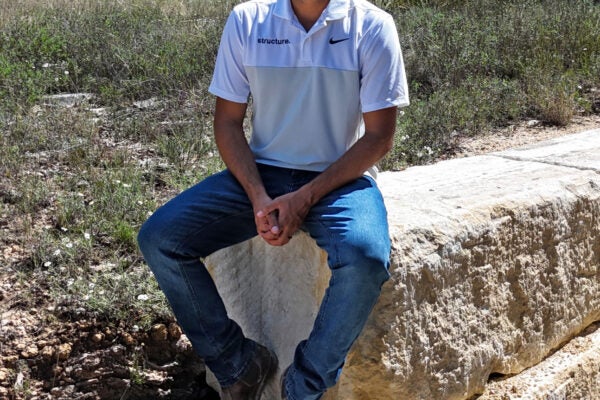Ganesh Padmanabhan, MBA ’12, Co-Founded a Company to Fix Problems in Health Care Using AI
by Omar L. Gallaga
Like many people during 2020, Ganesh Padmanabhan, MBA ’12, says he was questioning everything and looking for deeper meaning in life.
With his background in mechanical engineering, he had already helped Dell Technologies enter the cloud computing age before exiting to join an artificial intelligence firm in Austin. And he had experienced the challenge of co-founding a company in 2018, FeatureBase, which specializes in data analytics and machine learning. During the pandemic, Padmanabhan saw the world and his family struggling with health crises. He decided the skills he had developed to solve problems using gigantic amounts of data could pair well with artificial intelligence technology, which was starting to explode in popularity. “I was in data all my career, so it was an easy, natural transition for me,” he says.
It also helped give him a greater sense of purpose: He could use his talents to potentially save lives by applying them to the medical industry.
“Families were struggling. The virus was making us question our existence,” he says. “I have all of these skills in AI and technology, and I’m applying it to the wrong place. What am I to tell my grandchildren? That I helped everybody shop more and search more with AI?”
Facing a career crossroads, the entrepreneur turned his attention to a sector that was proving vulnerable as COVID-19 spread: the health care industry. During that time, he says, “You could see how fragile the health care system is around the world, not just in emergency response, but in general.”
In 2021, Padmanabhan started a year of research, consulting with experts at health care companies including Avant Health and Anthem, a part of Blue Cross Blue Shield, to learn about the technologies they were deploying and the problems that remained for health providers, medical networks, and patients. He learned, most importantly, that many of the problems are not insurmountable.
“As an engineer, I couldn’t unsee the fact that this is solvable. I walked away with the notion that health care is completely broken and needs a complete reimagination,” Padmanabhan says.
After that year of looking for health care’s biggest problems, he co-founded Autonomize AI, an Austin startup that works with other health care companies to leverage AI into their everyday practices. Padmanabhan realized that health care produces an enormous amount of data, but much of it goes unused because health companies don’t have the skills or resources to analyze that data or to find ways to harness its insights for better patient care or to make their businesses more efficient. That could be in billing, in handling patient records, in assisting with medical research, or in thousands of other ways that AI has yet to tackle.
Challenges of Health Care Tech
The health care technology industry is enormous: The Business Research Company, a market intelligence firm, forecast an 18% increase in the size of the market from $371.4 billion in 2022 to $439.5 billion in 2023. Some researchers estimate the market will hit nearly $1 trillion by 2027.

But not everyone thought Padmanabhan was wise to pivot to health care. Investors in his previous companies wondered why he would want to work in an industry in which he had no experience. “Everybody told me, ‘You’re dumb to go start something in health care. Ganesh, you could do almost anything. Why would you do health care?’”
The answer, he says, was that he could see ways that maturing artificial intelligence could take huge amounts of data and make sense of it in ways that humans can’t and that computers have not before. “You can actually make a meaningful impact on health care,” he says. “AI was the perfect platform to drive that business process transformation for these health care organizations so they can serve patients better.”
The challenge of working in health care is that it’s a highly regulated industry, with strict rules on patient confidentiality. Even a startup must comply with industry standards, just as a large corporation does. Health companies rely on long-held partnerships and relationships, making it tough for outsiders to gain traction quickly. And because medical technology literally has lives at stake, it must prove effective or it will lose trust.
Getting a Foothold
Padmanabhan did heed some of the warnings, making early moves that helped mitigate risks. He co-founded Autonomize with Kris Nair, a Dallas-based entrepreneur who had experience with a medical consulting company.
The idea was to focus on making sense of unstructured data from many different areas, everything from the patient chart a nurse might fill out to a patient’s imaging records (X-rays, scans) to the criteria needed for an experimental medical trial that could benefit, say, a Stage 4 cancer patient. Autonomize would develop “AI co-pilots” that could assist clinicians make more informed decisions by sorting data or making it more accessible. The company would also help other companies make their records processes more efficient.
Autonomize’s first customer was Austin-based Elligo Health Research, and its first project was to help the company select a few hundred patients out of 10,000 for a clinical trial. AI was used to review medical histories and documentation, which could run 2,000 to 3,000 pages per patient. During just two months, it was able to take criteria for the trial and rank the patients; without AI, the process could have taken more than nine months.
Since then, Autonomize has partnered with companies that subcontract with health care ventures such as the medical payments business Lyric Health (“the worker bees and horses that actually drive the systems,” he says) and brought on a chief medical officer. In late 2022, Autonomize was named one of 11 “Most Promising” early-stage companies by the Texas Life Science Forum.
Padmanabhan says that although it seems to many that AI has suddenly come out of nowhere as a huge, new technology, it has been steadily improving for more than 20 years. It hasn’t suddenly made a quantum leap, he says, but it has gained more attention as tools such as ChatGPT have gone mainstream and more people are finding new uses for the tech.
Still, he says, “AI is not a magic bullet.” It requires much hard work to make the right tools to find patterns in data and to make sense of it.
Autonomize is scaling up quickly. It had 25 employees at the end of 2023, with plans to grow up to 40. Its U.S. headquarters are in Austin, but Autonomize has a presence in Toronto, Canada, and Bangalore, India, where Padmanabhan studied and met his future wife, Anita. Padmanabhan is from Kerala, a coastal southern state in India that has the distinction of being the most literate state in the country.
Startup life is busy enough, but the couple also have two young children. Frequently, dinner-table conversation is about problems that he’s trying to solve at work. The work, Padmanabhan says, is highly motivating. It’s a chance to help improve people’s care and extend their lives. Every day, he says.
“It’s going to make me wake up and spring out of bed and try to solve a real problem.”
And that was what he wanted most when the pandemic stirred him to dream bigger.
About this Post
Share:


